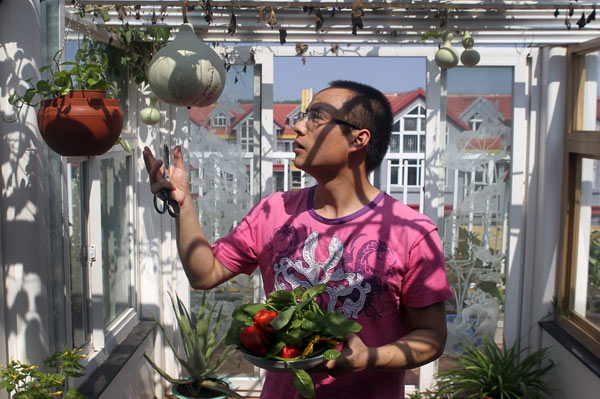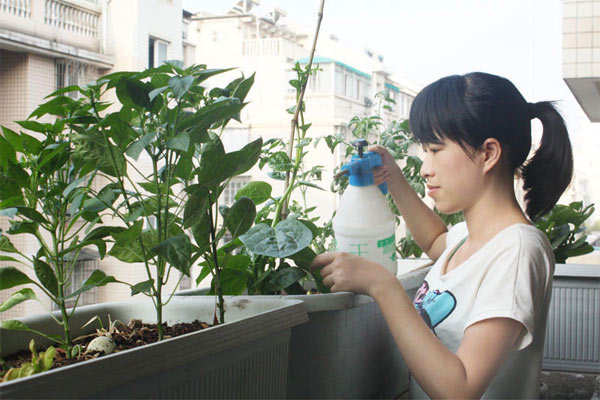A growing number of people have taken to "urban farming" in the wake of a series of food safety scandals. And, as He Na reports from Beijing, it's not just healthy, it's fun.
 |
|
Li Hongwen, 31, has planted more than 20 types of vegetables on his balcony in the Shunyi district of Beijing. Feng Yongbin / China Daily |
Han Qunhui's home in Changsha, Hunan province, is situated in a large community where most of the buildings look the same. Even friends who've visited several times before have been apt to get lost in the "maze" of houses.
But that's all changed recently. Now, visitors can find Han's home quickly, even if they still have no idea of her building and room number.
The change is due to Han's balcony: It resembles a green tent hanging outside the fifth floor, with towel gourd vines, rows of beans and agaric vegetables overflowing the open balcony, where large bowls of endive, lettuce and shallots also grow.
"My balcony is the best signpost," said the 28-year-old network designer.
"I haven't been to the market for vegetables for several days because the ones that grow on my balcony are enough for the daily needs of my husband and me," said Han, proudly. "I often share some with my neighbors, and they all like them."
It's hard to connect the fashionable-looking woman with vegetable planting, which is often seen as hard, dirty work. Han said she derives great enjoyment from her vegetables, but that's not the only reason she plants them.
A couple of overriding concerns led her to become an "urban farmer".
"First, I'm tired of the rapid rhythm of work and often dream of getting back to the land. Second - and this is more serious - food safety is a big concern," she said.
Food safety concerns
In recent years, a number of incidents concerning food safety have shaken public confidence: Melamine-contaminated milk; pork containing high amounts of illegally added thin carnosine, a steroid that can make humans sick; fake salty duck eggs, where food colorants have been added to produce red yolks; illegally recycled cooking oils; and vegetables with levels of pesticide residue well above legal limits. The list goes on.
"The cases really made me uneasy, said Han, who is planning to start a family very soon. He stressed that people must be sure that the food they eat is safe.
"The vegetables I grow are genuinely organic and don't contain pesticides. I spend a lot of time removing worms from the pots", she joked.
"The vegetables are really tender and refreshing and taste better than those bought at the market. My baby will be very healthy if she or he grows up eating the vegetables I grow," she said.
Like Han, an increasing number of people living in the cement-and-steel-made cities, young and old, have started urban farming and have become addicted to growing vegetables on their balconies.
According to Peng Kuo, the founder of www.52caiyuan - one of China's largest platforms for balcony vegetable growers - since the website was established in June 2010, the number of registered members has increased from roughly 100 to more than 40,000.
"The idea for the website came from those "vegetable-stealing" games that are popular online. I began to plant vegetables on the balcony in 2009 and often share my experiences and consult with others in our dedicated Internet group. To my surprise, many people have the same hobby as me. I am a website designer and it made sense to establish a larger platform so friends across the country could exchange views, experiences and improve our gardening skills," he said.
"New members register every day and I am fully confident that the site can be developed into a professional platform providing full service, from seeds, tools, seedlings, cultivation tips, making organic fertilizers, worm prevention, and harvesting," he said.
 |
|
Han Qunhui waters the vegetables growing on her balcony in Changsha, Hunan province. Provided to China Daily |
Business opportunity
The popularity of urban farming has led to a boom in sales of seeds, tools, organic fertilizers and technical books, both online and in brick-and-mortar stores.
A search for related topics on Taobao, one of China's leading online retail portals, reveals 29,278 items for sale, covering pretty much every requirement for the enthusiastic balcony horticulturalist.
Yu Fei, a project manager of Beijing Zhongnong Luyuan Engineering Technology Co in the capital's Fengtai district, said the company designed a range of equipment to help enthusiasts and sales have risen sevenfold since it was launched in 2010.
"The devices and technology promote cultivation via soil substitutes and hydroponics, which are clean and easy to use. Our sales keep increasing month by month. With the increasing concerns about food safety and greater attention on health, I am confident about the company's future," she said.
Suburban soil
In recognition of the market potential, agricultural expert Feng Jie, director of the Beijing Green Science Technology Center, also plans to extend cultivation spaces from balconies to rooftops and benefit more communities and companies.
She highlighted the importance of choosing the right type of soil and suggested using soil from the suburbs or rural areas, which is less likely to have been polluted by chemical waste from factories or the overuse of pesticide and chemical fertilizers.
"Seventy-five percent of our members plant vegetables on balconies because of concerns over food safety, especially families with elders and kids," Peng Kuo said. "If people are able to make rational use of their space and choose the right varieties of plants, the produce can satisfy part of the daily vegetable requirement for small families," Peng said.
"Since our bureau began to promote planting vegetables on balconies in 2007, the number of people consulting our hotline has increased greatly. Our nine operators receive an average of around 40 phone calls a day. As demand for consultations has grown, our team of experts has also expanded and currently we have 150 providing instructions," said Lu Tiangang, deputy director of the 12316 agriculture service hotline of the Beijing Agriculture Bureau.
"Two years ago we regularly took tools and samples to communities for promotional purposes, but now, we're invited to lots of communities to organize activities," he said.
Planting in soil requires a high level of technology, but the cost of the soilless cultivation method is also on the high side, so we suggest that residents plant bud seedlings, which only need water. Not only is the cost low, but the skills required are easy to acquire, he added.
Lu Jinhua, 67, a retired media worker from Beijing's Chaoyang district, is hooked on urban farming, and planting bud seedlings on her balcony is now her favorite hobby.
"As soon as I wake in the morning, the first thing I do is go to the balcony to see how my vegetables have grown. I take photos and write notes every day. It has made my retired life more meaningful," she said.
"After about a week, the seedlings grow to a height of about 10 centimeters. If it's the right time to harvest them, I will wash them and then add some salt and vinegar. The taste is just like the vegetables I had many years ago," she said.
Lu admitted having great concerns about food safety and said she doesn't dare to eat vegetables and fruit bought in the market without immersing them in water for a long period and then washing them thoroughly.
"Many years ago, we didn't have so many varieties of food, but at least it was safe. However, nowadays, we have a greater choice, but we dare not eat the food," she said.
Advantages
According to Peng Kuo, urban farming has a number of advantages, such as environmental protection and improvement, plus a healthier diet.
The popularity of urban farming indicates that people's awareness of health issues and food safety have increased and the practice should be encouraged, said Feng Jie. However, in some senses, it is the choice of the helpless, but can also be seen as silent protest against those who violate food safety and as a complaint to the government, Feng said.
"Though urban farming has many advantages, many people simply don't have the right conditions to do so. Even if everybody followed suit, it would still be impossible to grow every variety of vegetable. Solving the problem of food safety will require a greater effort from society as a whole, especially the law enforcement departments," she said.
Jiang Xueqing and Tang Yue contributed to the story
Contact the reporter at hena@chinadaily.com.cn
